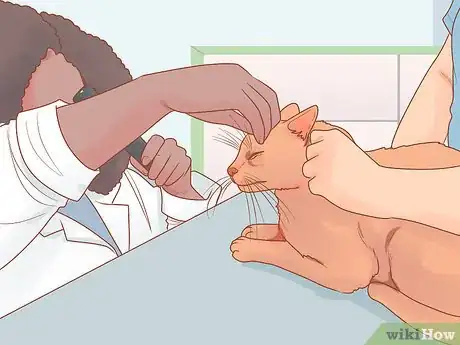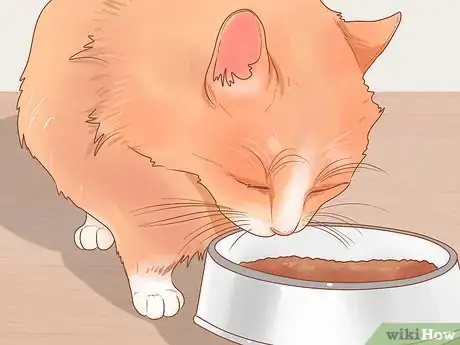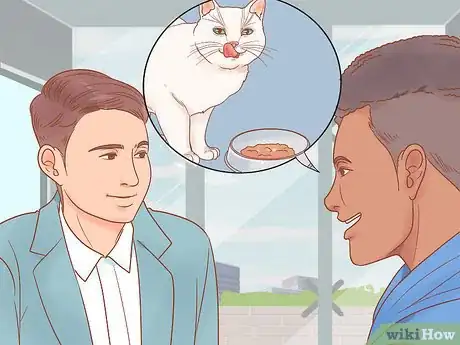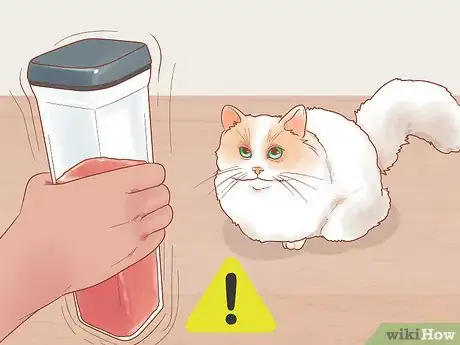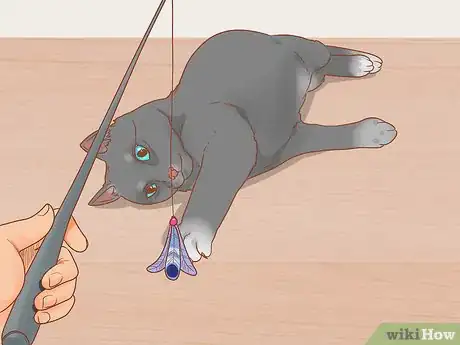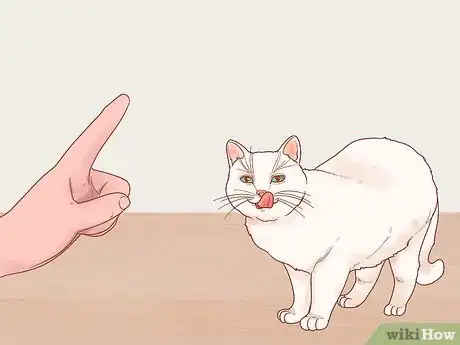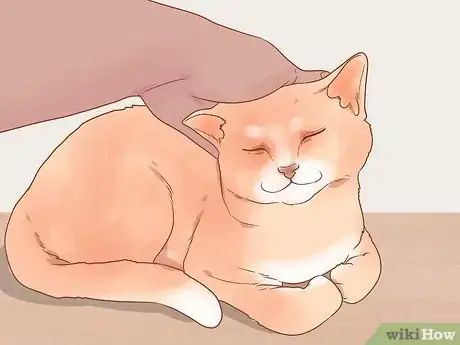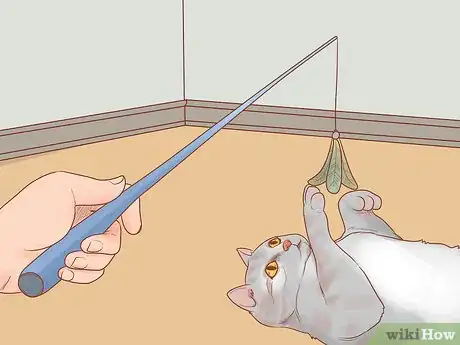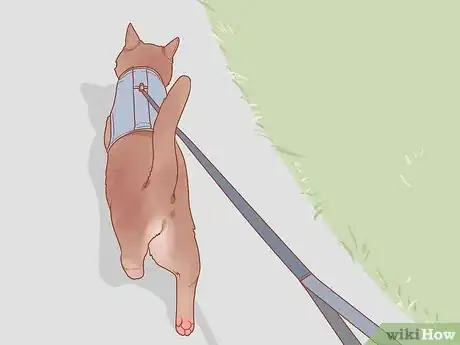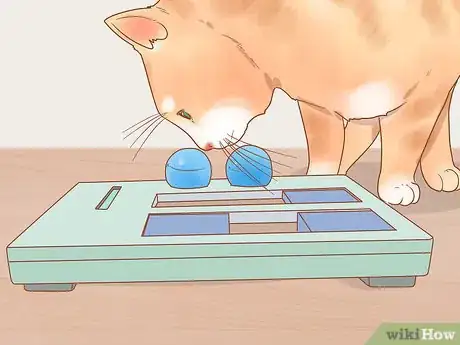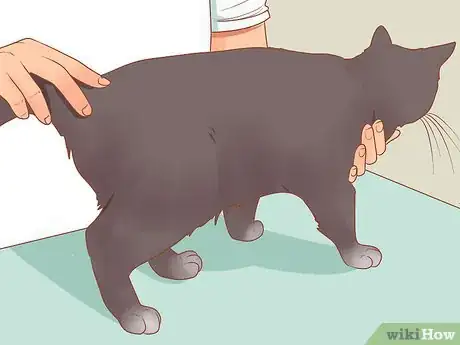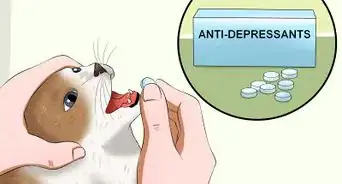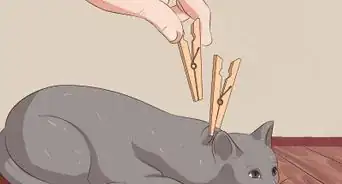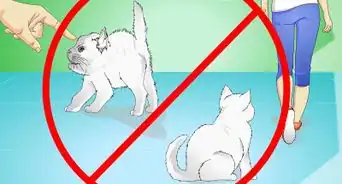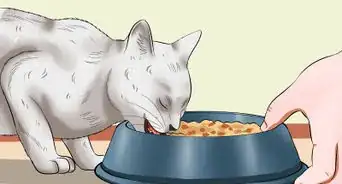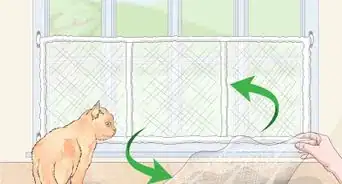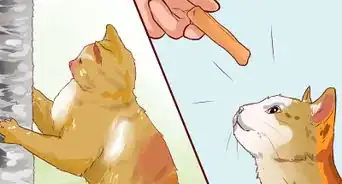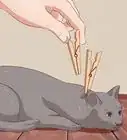This article was co-authored by Pippa Elliott, MRCVS and by wikiHow staff writer, Christopher M. Osborne, PhD. Dr. Elliott, BVMS, MRCVS is a veterinarian with over 30 years of experience in veterinary surgery and companion animal practice. She graduated from the University of Glasgow in 1987 with a degree in veterinary medicine and surgery. She has worked at the same animal clinic in her hometown for over 20 years.
This article has been viewed 55,039 times.
A cat can learn begging behavior through positive reinforcement: your cat nags you, you give it what it wants (food, cuddles, your warm and comfy seat), and your cat learns that begging is rewarded. To get your cat out of a begging habit, start by consulting your vet to ensure there aren’t any medical or psychological issues involved. Then, work on creating consistent routines, rewarding good behavior and ignoring begging, and keeping your cat occupied when you’re home and away.
Steps
Ruling Out Medical or Psychological Issues
-
1Get a vet check for illnesses like parasites, hyperthyroidism, and diabetes. Make sure that your cat is healthy before trying to address the begging behavior. Sometimes begging and/or constant meowing can be an indication of illness or a disorder. Take your cat to the vet for a health checkup and mention the behavior.[1]
- If a cat is ravenously hungry all of the time, and is begging for more food, this may sometimes be due to feline diabetes or hypothyroidism. Or, it may have intestinal parasites that are “stealing” the nutrients it consumes.
- If a cat is meowing a lot, it may be a sign that it has a disorder such as kidney disease or an overactive thyroid.[2]
-
2Consult the vet about your cat’s nutritional requirements. It’s possible that your cat begs for food because it’s simply not being fed enough, or that the food you give it provides insufficient nutrition. Talk to your vet about the ideal food type and feeding routine for your cat, based on factors like age, breed, and overall health.[3]
- Give your cat a high-quality cat food that provides balanced nutrition.
- Additionally, make sure it has access to fresh, clean water at all times.
Advertisement -
3Do an evaluation for an eating disorder or other psychological issue. Cats can develop “psychogenic abnormal feeding behaviors” that lead to frequent begging and other problems surrounding eating. Describe your cat’s eating routines and any triggers for begging or other problematic behaviors to your vet.[4]
- Such disorders can cause a cat to refuse to eat to the point of malnutrition, or to overeat (and yet beg for more) to the point of causing health problems.
- Medical interventions may sometimes be necessary, but changing routines and behaviors at home may help overcome such disorders.
-
4Ask if your cat may have an attention-seeking behavior problem. This is a particular type of “psychogenic abnormal feeding behavior” in which your cat uses overeating (or not eating) and begging as a way to demand your attention. This can be a response to being excessively bored and/or ignored, or it may develop in cats that are given plenty of attention and simply crave even more.[5]
- Beyond making sure your cat receives adequate attention and mental stimulation, the best way to address this issue is typically to reward positive behaviors and redirect or ignore negative ones (like begging).
Establishing Routines and Positive Rewards
-
1Build consistent routines around begging-related behaviors. If your cat always gets food when it demands it, stop providing the food in response to the begging behavior. Instead, set two consistent feeding times each day that are always met, and do not feed your cat outside those times.[6]
- Don’t leave the food out all day, either. Give your cat a reasonable time to eat—like 30 minutes—each feeding time, then remove the food dish until the next feeding time.
- Alternatively, if your cat begs to go outdoors, schedule regular sessions of supervised outdoor time each day, or you might even install a catflap to allow your cat to let itself out.
-
2Distract your cat when it begins to beg. When your cat starts begging, calmly and quietly pick it up, take it to another room, and try to distract it with a toy or game. As soon as your cat stops whining or meowing, praise it by petting it, saying “good kitty,” and playing or cuddling with it for a few minutes.[7]
- The goal here is to redirect it away from begging and toward a positive behavior that you can reward.
-
3Ignore your cat if it continues begging. If your cat returns to begging after you’ve redirected it once, ignore it for as long as the begging continues. Don't give it negative attention, such as telling it "no" or wagging your finger at it. Instead, act as if the cat isn't there whenever it begs.[8]
- Your cat needs to learn that you are not going to respond to its begging behavior, teaching it that there is no reward.
-
4Reward good, non-begging behavior enthusiastically. As soon as your cat stops begging on its own, turn your full attention to it and praise it verbally and physically. This positive reinforcement must be immediate in order for your cat to properly associate it with the preceding behavior (e.g., not begging).[9]
- While you can occasionally use treats to reward calm, desirable behavior, don’t fall into the trap of handing them out all the time. Rely instead on praise that’s verbal and physical (such as petting). Otherwise, your cat may deduce that it can pester you for treats rather than earn them.
Keeping Your Cat Happy and Occupied
-
1Interact and play with your cat regularly. If your cat is begging for attention, try giving it more of what it craves! Get down on the floor and drag a string around for it to chase, or simply pet and talk to it while it nestles in your lap. Aim for, at minimum, 15-20 minutes of focused 1-on-1 time per day.[10]
- Cats may have a reputation for being aloof, but they like getting attention—at least when it’s on their own terms!
-
2Provide supervised time outdoors. It’s easier than you may think to leash train a cat, and using a leash will let you walk and explore the outdoors together safely. You’ll both get some exercise and 1-on-1 time together![11]
- If you cat isn’t on a leash outdoors, keep it in an enclosed yard and supervise its activity. Even better, play with your cat in the yard.
-
3Occupy your cat with toys and puzzles to limit boredom. True enough, a simple ball of yarn or toy mouse can make a great play item for your cat. Additionally, though, set up some cat-friendly toys, mazes, and puzzles to keep a feline friend mentally stimulated.[12]
- Simple food puzzles, which require your cat to work a little for their meal, can make feeding time more fun and interactive.
- Don’t use toys and puzzles as a substitute for 1-on-1 time with your cat, though. Instead, play together!
-
4Keep your cat’s stress levels to a minimum. Take a moment to consider whether your cat has started begging in response to life upheavals. Changes in the household, such as the arrival of a new baby or an additional pet, can cause stress that results in begging behaviors. Likewise, home renovations, moving, or shifting attention from your cat to work or other projects can be feline stressors.[13]
- If you cannot remove or improve on what is creating the stress, at least spend more time with your cat and reassure it a lot.
- When you know a big change is coming, try to slowly introduce your cat to the new reality instead of making it an all-at-once shock.
References
- ↑ https://cattime.com/cat-facts/health/23313-how-to-deal-with-a-food-obsessed-cat
- ↑ http://pets.webmd.com/cats/guide/cats-excessive-meowing#1
- ↑ https://cattime.com/cat-facts/health/23313-how-to-deal-with-a-food-obsessed-cat
- ↑ https://cattime.com/cat-facts/health/23313-how-to-deal-with-a-food-obsessed-cat
- ↑ https://cattime.com/cat-facts/health/23313-how-to-deal-with-a-food-obsessed-cat
- ↑ http://www.vetstreet.com/our-pet-experts/cat-always-meow-to-go-out-6-ways-to-stop-it
- ↑ https://cattime.com/cat-facts/health/23313-how-to-deal-with-a-food-obsessed-cat
- ↑ https://cattime.com/cat-facts/health/23313-how-to-deal-with-a-food-obsessed-cat
- ↑ http://www.vetstreet.com/our-pet-experts/cat-always-meow-to-go-out-6-ways-to-stop-it
- ↑ http://www.vetstreet.com/our-pet-experts/cat-always-meow-to-go-out-6-ways-to-stop-it
- ↑ http://www.vetstreet.com/our-pet-experts/cat-always-meow-to-go-out-6-ways-to-stop-it
- ↑ http://www.vetstreet.com/our-pet-experts/cat-always-meow-to-go-out-6-ways-to-stop-it
- ↑ https://pets.webmd.com/cats/guide/cats-excessive-meowing#1
About This Article
To stop your cat from begging, ignore it whenever it begs so it learns that you won't respond to its begging behavior. Avoid scolding your cat or giving it any attention or you might inadvertently reward the begging. Then, as soon as your cat stops begging, praise it verbally and physically so it starts to associate its good behavior with getting a reward. For more advice from our Veterinary co-author, like how to tell if your cat's begging is the result of a medical or psychological issue, keep reading.
